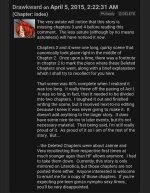Kelliezgirl
Debauched Dilettante
- Joined
- Oct 17, 2023
- Posts
- 2,977
What a merchant chooses to stock is not censorship.
If they are bowing to outside pressure I'd say it is. If you look at the history of the Parents Musical Resource Committe (the reason for warning labels on music) it was consistently characterized as censorship.
https://www.newsweek.com/2015/10/09...r-explicit-rock-lyrics-dee-snider-373103.html
"The Senate Committee on Commerce, Science, and Transportation heard testimony from three popular musicians: Frank Zappa, Dee Snider and John Denver.
All three argued voraciously against what they characterized as censorship. In perhaps the most enduring testimony from the hearing, Zappa described the PMRC's proposal as "an ill-conceived piece of nonsense which fails to deliver any real benefits to children, infringes the civil liberties of people who are not children and promises to keep the courts busy for years."


